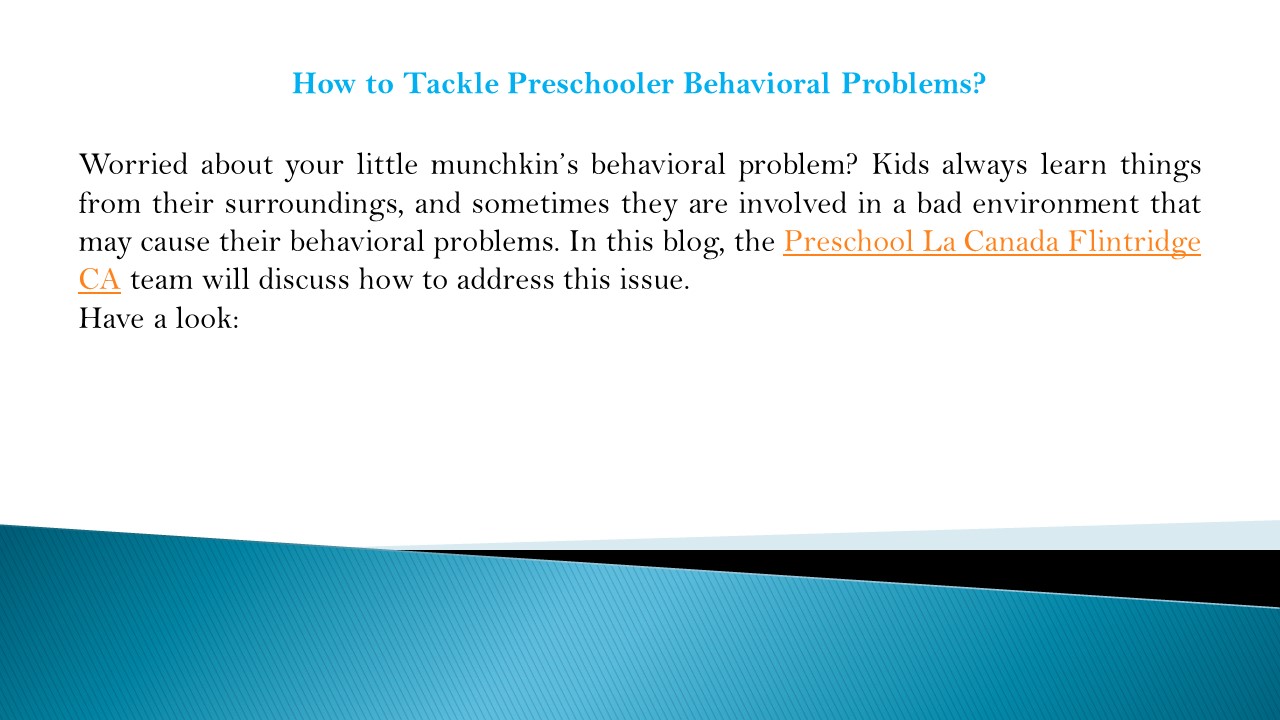How to Tackle Preschooler Behavioral Problems? - PowerPoint PPT Presentation
Title:
How to Tackle Preschooler Behavioral Problems?
Description:
In this Presentation, the Preschool La Canada Flintridge CA team will discuss how to address this issue. Have a look: – PowerPoint PPT presentation
Number of Views:7
Title: How to Tackle Preschooler Behavioral Problems?
1
How to Tackle Preschooler Behavioral Problems?
Worried about your little munchkins behavioral
problem? Kids always learn things from their
surroundings, and sometimes they are involved in
a bad environment that may cause their behavioral
problems. In this blog, the Preschool La Canada
Flintridge CA team will discuss how to address
this issue. Have a look
2
(No Transcript)
3
Establish routines Consistency and this go hand
in hand. Routines give kids a sense of security
and let them know what to anticipate from adults,
which in turn encourages acceptable
behavior. Provide options Preschoolers take
satisfaction in becoming self-sufficient "big
kids." Giving children a sense of control over
their lives can greatly improve their behavior.
Some children, especially those who are getting
near age 3, will perform better with two to three
options. Older preschoolers may have more
alternatives available to them, such as selecting
clothing from their complete wardrobe or any
somewhat nutritious food from the supermarket.
4
(No Transcript)
5
Try to know the reasons behind their behavior
problems Knowing the cause of their behavior is
essential, especially when they are around
children or other people. However, there was a
more significant factor behind these preschool
behavior issues than just the fact that they
"felt like it." Instead, it appeared that they
had trouble managing personal space after hearing
the teacher explain the event. You see, some
youngsters would sit too near to him or even
accidentally kick him when they moved, invading
their personal space. Their teacher was able to
prevent the youngster from retaliating and
hitting by addressing the root cause, which was a
need for personal space.
6
(No Transcript)
7
Sets expectations The easiest method to properly
set expectations is to create a preschool
behavior management plan and share it with the
kids. The kids will understand what behavior is
appropriate in this way. A comprehensive
strategy also helps young people make good
decisions and lowers worry.
8
(No Transcript)
9
Therapy for parent-child interactions (PCIT) In
PCIT, parents guide children between the ages of
2 and 7 through a series of exercises and
practice skills for setting limits and
effectively responding to both desired and
undesirable behavior while receiving live
coaching from therapists behind a one-way mirror.
Typically, training involves 1417 weekly
sessions. Never yell at, chastise, or become
enraged with the challenging youngster. You must
maintain your composure to convey to them that
their behavior was inappropriate. Young children
are particularly interested in the "why" behind
things. Tell them why you won't put up with their
actions. Say, "I don't like it when you punch
someone because it hurts." Make it obvious to
them that you are upset with their actions, not
them.
10
(No Transcript)
11
Conclusion The Preschool Altadena CA team
suggests that you always behave well in front of
your child. They always learn from your behavior
and surroundings. Set yourself up as a role model
for them. Always show them you are always around
them, no matter what the situation. Parents will
always appreciate anything that encourages a
child's good behavior.
12
CONTACT US
Princeton Montessori Academy Every Child Can
Succeed! 922 E. Mendocino Street, Altadena CA
91001. Phone (626) 794-2244 Email princetonmon
tessoriacademy_at_gmail.comWebsite
https//www.princetonmontessoriacademy.com/prescho
ol-pasadena
13
Thank You






























